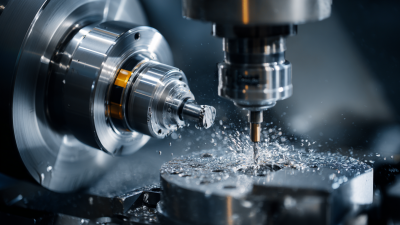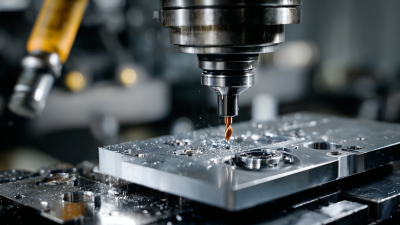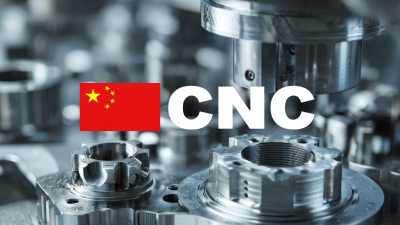
- sales@bjbod.com
- Mon - Sat at 7:00AM to 9:00PM

Choosing the right manufacturer for custom milled parts is a critical decision that can significantly impact the efficiency and quality of production processes in various industries. According to a report by MarketsandMarkets, the global CNC machining market is projected to reach USD 100 billion by 2025, reflecting a growing demand for precision-engineered components. Custom milled parts are essential in sectors such as aerospace, automotive, and medical devices, where high tolerances and material specifications are paramount. In these competitive markets, selecting a manufacturer who not only meets technical requirements but also aligns with your business goals and quality standards is vital. This blog will explore key factors to consider when evaluating potential manufacturers, ensuring that you make an informed decision in an increasingly complex manufacturing landscape.

When selecting a manufacturer for custom milled parts, it's crucial to first identify your specific needs. According to a report by IBISWorld, the custom machining industry has experienced a growth rate of 3.5% per year over the last five years, indicating a strong demand for precision made components. Understanding the type of materials you require, such as aluminum alloys or stainless steel, can help narrow down suitable manufacturers who specialize in those materials.
Additionally, consider the production volume and tolerances necessary for your project. A survey by SME (Society of Manufacturing Engineers) revealed that 63% of manufacturers prioritize precision and custom specifications when choosing a supplier. This statistic emphasizes the importance of clear communication regarding your design requirements, as well as any specific industry certifications needed, such as ISO 9001. By thoroughly assessing these factors, you can ensure that your selected manufacturer aligns closely with your operational needs and quality expectations.

When selecting a manufacturer for custom milled parts, evaluating their expertise and capabilities is paramount. Firstly, examine the manufacturer's experience in the industry. A well-established company with a proven track record is likely to possess the knowledge required to handle various complexities involved in custom milling. Look for case studies, client testimonials, and examples of previous projects that showcase their ability to deliver high-quality parts. This insight not only validates their competency but also gives you an idea of their specialization in materials and techniques relevant to your needs.
Additionally, assess the technological capabilities of the manufacturer. Advanced machinery and up-to-date manufacturing processes are essential for precision and efficiency. Inquire about the types of milling equipment they use, as well as their quality control measures. A manufacturer who invests in state-of-the-art technology is more likely to produce parts that meet stringent specifications. Furthermore, it is beneficial to discuss their capacity for handling varying volumes of production, from prototyping to large-scale manufacturing. This ensures that the manufacturer can scale their operations to meet your project’s demands seamlessly.

When selecting a manufacturer for custom milled parts, understanding the material options available is crucial to ensuring high-quality outcomes. Material selection directly impacts the performance and durability of the finished product. For instance, data from the "2019 Global Advanced Manufacturing" report indicates that over 60% of industry leaders cite material selection as a key factor in influencing the overall quality of their products. Metals like aluminum and stainless steel are popular due to their excellent strength-to-weight ratios, while polymers offer cost-efficiency and versatility in applications.
**Tip:** Always verify the manufacturer's material certifications. This ensures that the materials used meet industry standards and specifications you require for your project.
Moreover, different materials can affect machining processes and tolerances. For example, while harder materials may require specialized tooling and longer lead times, softer materials may be easier to mill but can compromise structural integrity under stress. According to a study by the American Machining Society, 72% of manufacturers who utilize advanced materials reported fewer quality issues and defects. Thus, aligning your project requirements with the right material is essential for achieving optimal performance.
**Tip:** Engage in discussions with your manufacturer about their material sources and the potential impact on your project's timelines and costs.
| Material Type | Characteristics | Best Use Applications | Cost per Unit ($) | Lead Time (Weeks) |
|---|---|---|---|---|
| Aluminum 6061 | Lightweight, corrosion-resistant, good machinability | Aerospace, automotive parts, architectural components | 5.00 | 2-3 |
| Stainless Steel 304 | High strength, excellent corrosion resistance | Food processing, medical equipment, chemical containers | 8.00 | 3-4 |
| Polycarbonate | High impact resistance, light weight, optical clarity | Safety glasses, medical devices, automotive lighting | 4.00 | 1-2 |
| Titanium Alloy | High strength-to-weight ratio, corrosion-resistant | Aerospace, marine applications, medical implants | 25.00 | 4-6 |
| Brass | Good machinability, corrosion resistance, attractive finish | Plumbing fittings, musical instruments, electrical connectors | 6.00 | 2-3 |
When selecting a manufacturer for custom milled parts, assessing production lead times and flexibility is critical to ensuring your project stays on schedule and meets evolving demands. According to a report by SME, nearly 55% of manufacturers face delays due to inadequate lead time forecasting, which can significantly affect project timelines and deliverables. A responsive manufacturer should not only provide accurate lead time estimates but also demonstrate agility in adjusting production schedules as needed.
Furthermore, flexibility in production is paramount, particularly in industries that experience frequent changes in specifications or order quantities. According to the 2021 Manufacturing Supply Chain Survey by IndustryWeek, companies that partnered with flexible manufacturers reported a 30% reduction in downtime during transition phases. This adaptability can give your business a competitive edge, allowing for quick pivots in response to market demands, while also minimizing the risk of costly delays. Selecting a manufacturer with a proven track record in managing lead times and flexibility can fundamentally enhance your operational efficiency and responsiveness.
This bar chart illustrates the average production lead times for custom milled parts from various manufacturers, highlighting the flexibility in meeting deadlines.
When selecting a manufacturer for custom milled parts, one of the most critical factors to consider is customer feedback and industry reputation. According to a 2022 survey by the Fabricators & Manufacturers Association (FMA), 70% of industry professionals rate customer reviews as a primary source of information when choosing a supplier. This statistic underscores the importance of investigating reviews on platforms like Trustpilot and Google Reviews, where previous customers often share their experiences regarding quality, lead times, and service reliability.
Additionally, evaluating a manufacturer's reputation within the industry can provide valuable insights. Research from Statista indicates that 65% of companies prefer to work with manufacturers that have received industry awards or certifications, as these accolades often reflect a commitment to excellence and innovation. Engaging with industry publications and forums can also reveal narratives about a manufacturer’s performance and reliability. By prioritizing customer feedback and maintaining a keen eye on industry reputation, businesses can make informed decisions that lead to successful partnerships for their custom milling needs.





